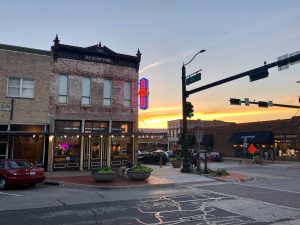
Colorado’s Allure

Texas: The Land of Diversity

Florida’s Coastal Oasis
Nomad Community and Infrastructure: Building Connections
Beyond the physical spaces, these states foster vibrant nomad communities. Networking events, meetups, and specialized infrastructure cater to the nomadic lifestyle, offering connections and support. Whether you seek a quiet corner for solo work or a bustling hub for collaborative endeavors, these destinations weave a tapestry of opportunities for digital nomads seeking a perfect remote work-life balance.
Security in Florida, Colorado and Texas
Security assessment in Colorado, Texas, and Florida involves considering various aspects, including personal safety, digital security, and overall stability.
Personal Safety:
– Colorado: Generally safe, but certain areas might experience petty crimes or natural hazards due to the rugged terrain. Cities like Denver have moderate crime rates.
– Texas: Safety varies across cities. Urban areas might have higher crime rates compared to suburban or rural regions. Cities like Austin and Plano are considered relatively safe.
– Florida: Safety levels fluctuate across regions. Urban areas like Miami might have higher crime rates, while suburban areas or smaller towns could be safer.
Digital Security:
– Check the reliability and security measures of the co-working spaces or remote work hubs in these states. Ensure they provide secure internet connections and have protocols in place to safeguard against cyber threats.
General Stability:
– Consider factors like political stability, healthcare infrastructure, and emergency services accessibility in these areas. Colorado, Texas, and Florida generally offer stable environments but might differ in specific aspects based on cities or regions.
Local Laws and Regulations:
– Understand local laws, especially related to remote work, residency, and any specific regulations that might impact digital nomads staying or working in these states.
In conclusion, Colorado, Texas, and Florida offer promising prospects for digital nomads seeking remote workspaces. Each state boasts a unique blend of opportunities and challenges regarding security considerations.
While Colorado embraces a harmonious blend of natural beauty and tech-driven urban hubs, safety concerns might vary across its diverse landscapes. Texas, with its cultural diversity and emerging tech scenes, presents a range of safety scenarios, necessitating a nuanced understanding of each city’s security landscape. Florida, famed for its coastal charm and urban vibrancy, calls for a discerning eye on safety, especially in bustling metropolitan areas.
For digital nomads, conducting thorough security assessments encompassing personal safety, digital security, and local stability is imperative. Leveraging reliable resources, engaging with local communities, and staying informed about regional laws and regulations are integral steps in ensuring a secure and fulfilling nomadic experience in these diverse states.
Ultimately, while each state has its unique allure, an informed and cautious approach toward security assessments empowers digital nomads to navigate and thrive in these promising destinations. By prioritizing safety considerations, nomads can unlock the true potential of remote workspaces in Colorado, Texas, and Florida, fostering a fulfilling nomadic journey.









